Unlike regular seaweed, which is seasonal and affected by ocean pollutants which the algae absorbs, Seakura’s product can be harvested up to 5 times a year, producing more than 100 tons per acre annually, and is exceptionally rich in minerals after being grown in purified water.
Israeli ‘Super’ Seaweed Company Seakura Hopes To Solve World Food Crisis
By Minna Fingerhood, NoCamels November 13, 2017
http://nocamels.com/2017/11/israel-seakura-sets-sights-on-land/
What is green, rather slimy, and makes a regular appearance in foodie kitchens and vegan menus across the world? If you guessed seaweed, you’re right. And one Israeli company has figured out a way to turn the marine algae, already a star in Asian cooking, not only into the “king of superfoods,” but also as the possible answer to food shortage.
Seakura, headquartered in Herzliya and with offices in the UK, the Netherlands and Belgium, has worked since 2006 to develop and produce its organic “super seaweed” — with one serving having double the amount of protein, iron, and fiber found in dried seaweed harvested from seawater. For every 100 grams, Seakura’s signature “sea lettuce” contains 31.9 grams of protein, 38 grams of fiber, 2389 mg of magnesium, and 21.9 mg of Vitamin C, the company says.
Over the past decade, Seakura has become a world leading producer of the algae, offering a series of seaweed products and applications to food retail companies and supermarkets across the world including Delhaize, Planet Organic, Tesco, and Whole Foods.
SEE ALSO: Israeli Farm Seakura Produces New Superfood: Organic Seaweed Grown Outside The Sea!
Seakura has also developed a special method of producing its seaweed, farming it inland using the company’s innovative and clean aquaculture technology (the farming of aquatic organisms). Grown in controlled pools using purified Mediterranean seawater, Seakura’s products are fresh, leafy and ready to eat, unlike seaweed that’s grown in seawater and is later dried.
With a variety of products such as crackers, bars, bread, and even a seaweed-based pesto sauce (which, from personal experience is particularly delicious) already on offer, Seakura now wants to take its operations further, with plans to open a bakery in the coastal town of Netanya later this month. If one was ever in the mood for a seaweed muffin, tart or croissant, this bakery is likely the answer.
Why Seaweed?
Seakura owner Yossi Karta tells NoCamels that the company started its focus on seaweed because of its evolutionary significance. “Most of the plants on earth came from seaweed, according to evolution. So, if it started from seaweed, it means that the seaweed has all the base material to build almost everything,” he said.
Algae has been a vital source of protein for humans, he indicated in an interview this summer with Globes, adding that seaweed also has other important uses. “Algae can be used both as a direct food for humans and as vegan gelatin for food and industry, for example as a basis for petri dishes used to culture cells, such as bacteria and small mosses.”
Seakura’s farm north of Tel Aviv
Seakura has worked hard since 2006 to find the perfect method and product. A team of more than 15 researchers led by Professor Yonathan Zohar, head of department of Marine Biology at University of Maryland, spent years breeding the most nutritious version of the plant. The end result was two strands: Gracilaria and Ulva, available as stand-alone and in a variety of Seakura’s products.
SEE ALSO: Israeli Researcher Proposes To End World Hunger With Bigger Fish
The company’s patent-pending aquaculture technology requires growing the algae in small pools on a farm just north of Tel Aviv which also houses an on-site research institute. The pools are equipped with filters and sensors that closely monitor and control water quality. Eventually the plants are transferred to larger pools where they are further grown and harvested.
Unlike regular seaweed, which is seasonal and affected by ocean pollutants which the algae absorbs, Seakura’s product can be harvested up to 5 times a year, producing more than 100 tons per acre annually, and is exceptionally rich in minerals after being grown in purified water.
The product is unparalleled, Karta tells NoCamels. “We don’t have competitors. Nobody has this technology,” he claims.
Landweed?
Seakura is now setting its sights on moving operations to land, mainly for safety and environmental reasons. Karta says workers who harvest the seaweed would be less exposed to danger and infection caused by pollutants, working conditions would be more reasonable and the crop would no longer be seasonal.
Zohar said growing the seaweed in these conditions would increase the nutritional value to “many times better than in nature, especially protein, but also calcium and iodine.”
Karta said Seakura has “finished the experimental stage on our farm and the patent registration processes. Our job is not to create the algae; it is to create the machine through which the alga can be created in its natural place.”
Karta also indicated to NoCamels that part of developing the technology to facilitate all sea processes to occur on land includes creating sustainable and efficient ways to farm fish outside of the sea. Its success would offset concerns of overfishing while also creating a new food source to feed an ever-growing world population said to be soon facing a food crisis.
Soon, the company may turn to selling its innovative farming technique and technology, Karta suggested.
Through its products and the upcoming bakery, Seakura is already transforming how we eat seaweed. By boosting the cleanliness and nutritional value of the kelp to eventually farming fresh and sustainable fish, the world should want Seakura to succeed.
Ég er alls ekki ađ segja ađ allt sé heppilegt, en athuga möguleikana.
Egilsstađir, 19.11.2017 Jónas Gunnlaugsson



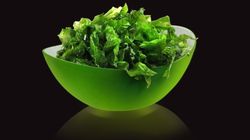
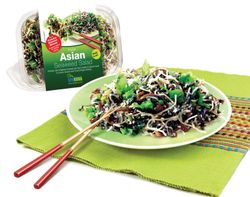
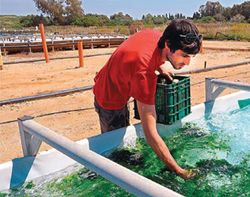
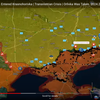


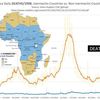
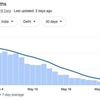
Bćta viđ athugasemd [Innskráning]
Ekki er lengur hćgt ađ skrifa athugasemdir viđ fćrsluna, ţar sem tímamörk á athugasemdir eru liđin.